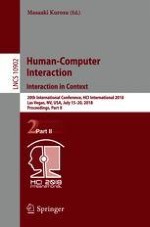2018 | OriginalPaper | Buchkapitel
Bias in Perception of Art Produced by Artificial Intelligence
verfasst von : Joo-Wha Hong
Erschienen in: Human-Computer Interaction. Interaction in Context
Aktivieren Sie unsere intelligente Suche, um passende Fachinhalte oder Patente zu finden.
Wählen Sie Textabschnitte aus um mit Künstlicher Intelligenz passenden Patente zu finden. powered by
Markieren Sie Textabschnitte, um KI-gestützt weitere passende Inhalte zu finden. powered by
